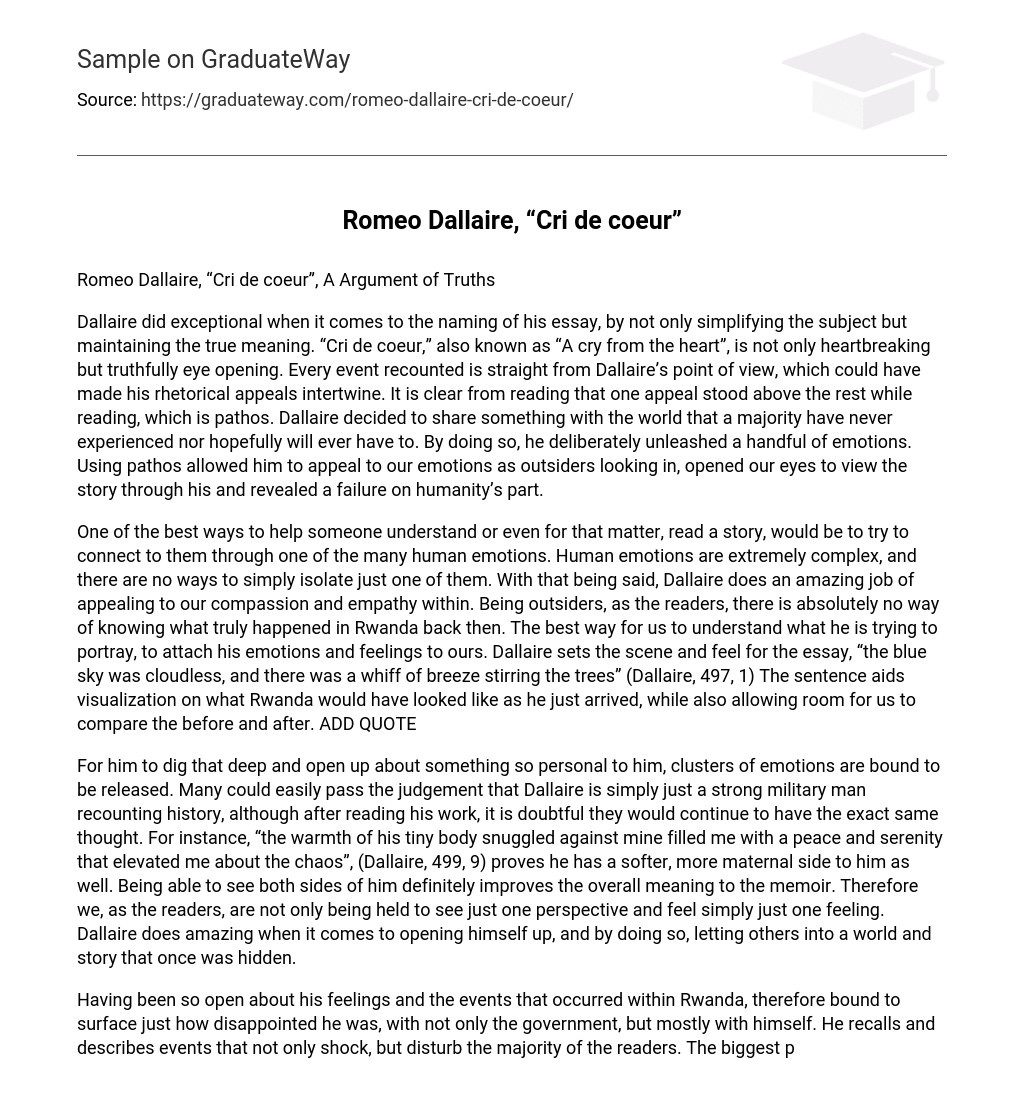Dallaire did exceptional when it comes to the naming of his essay, by not only simplifying the subject but maintaining the true meaning. “Cri de coeur,” also known as “A cry from the heart”, is not only heartbreaking but truthfully eye opening. Every event recounted is straight from Dallaire’s point of view, which could have made his rhetorical appeals intertwine. It is clear from reading that one appeal stood above the rest while reading, which is pathos.
Dallaire decided to share something with the world that a majority have never experienced nor hopefully will ever have to. By doing so, he deliberately unleashed a handful of emotions. Using pathos allowed him to appeal to our emotions as outsiders looking in, opened our eyes to view the story through his and revealed a failure on humanity’s part.
One of the best ways to help someone understand or even for that matter, read a story, would be to try to connect to them through one of the many human emotions. Human emotions are extremely complex, and there are no ways to simply isolate just one of them. With that being said, Dallaire does an amazing job of appealing to our compassion and empathy within. Being outsiders, as the readers, there is absolutely no way of knowing what truly happened in Rwanda back then.
The best way for us to understand what he is trying to portray, to attach his emotions and feelings to ours. Dallaire sets the scene and feel for the essay, “the blue sky was cloudless, and there was a whiff of breeze stirring the trees” (Dallaire, 497, 1) The sentence aids visualization on what Rwanda would have looked like as he just arrived, while also allowing room for us to compare the before and after.
For him to dig that deep and open up about something so personal to him, clusters of emotions are bound to be released. Many could easily pass the judgement that Dallaire is simply just a strong military man recounting history, although after reading his work, it is doubtful they would continue to have the exact same thought. For instance, “the warmth of his tiny body snuggled against mine filled me with a peace and serenity that elevated me about the chaos”, (Dallaire, 499, 9) proves he has a softer, more maternal side to him as well.
Being able to see both sides of him definitely improves the overall meaning to the memoir. Therefore we, as the readers, are not only being held to see just one perspective and feel simply just one feeling. Dallaire does amazing when it comes to opening himself up, and by doing so, letting others into a world and story that once was hidden.
Having been so open about his feelings and the events that occurred within Rwanda, therefore bound to surface just how disappointed he was, with not only the government, but mostly with himself. He recalls and describes events that not only shock, but disturb the majority of the readers. The biggest parts of the whole essay that truly emotionally connected to people in more ways than one would have to be the description of the young orphaned boy and the way the government talks about the situation. “We will recommend to our government not to intervene as the risks are high and all that is here are humans.” (Dallaire, 502, 18)
Being able to look at the devastating chaos and be able to say “all that is here are humans.” As if humans- young or old, black or white, male or female, aren’t worth our time and oh so valuable finances. If Dallaire did not have readers attentions before his point, it is guaranteed he did afterwards.
Rwanda was not the first of its kind and more than likely, unfortunately, won’t be the last. Thankfully people like Romeo Dallaire, will shed some light on a rather dim and dark topic. To many, the horrid past events which took place in 1994 in the small African country of Rwanda, was simply just that, past events.
Through the use of pathos, Dallaire really helped to establish an emotional connection to the chaos that is. Choosing to appeal to our human emotions through his emotions, creates a connection that will not soon be forgotten. As using pathos allowed him to appeal to our emotions as outsiders looking in, opened our eyes to view the story through his and revealed a failure on humanity’s part as a whole.
Work Cited
- Cri de coeur, LT.-GEN. Romeo Dallaire with Major Brent Beardsley, pg.496, Writing Today- WRIT 3002





